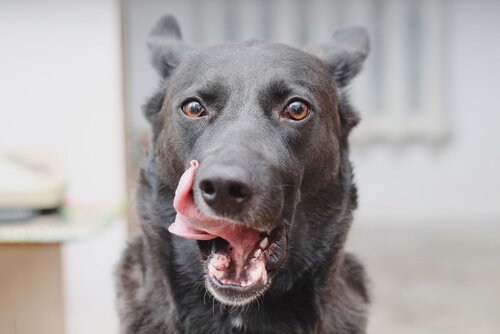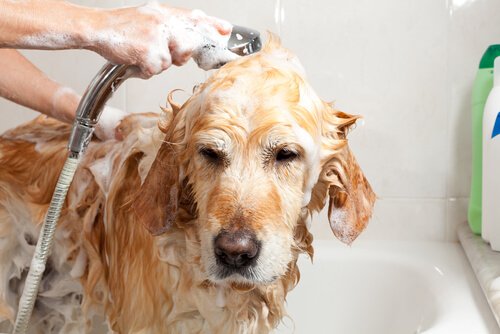7 Signs that Your Dog is Stressed Out

Many dogs suffer from stress. Our way of life forces them to live the noise from the street, having several encounters with other dogs or having to walk with a very short leash. All of these factors of our everyday life causes them to feel stressed. Below are some of the signs that indicate your dog is stressed out.
Signs that a dog is stressed out
Like humans, dogs can suffer from stress. This state of nervousness can occur for several different reasons and, although each dog will have different symptoms, you can look for a few more common signs.
Throughout their daily lives, dogs can go through many things that cause them stress. If they don’t have long periods of rest and days with stressful factors, their nervousness builds up, and then stress-related problems start to appear.
The most common reasons dogs end up being in this state are the high demand we place on their behavior: many commands, corrections or dealing with things that scare them throughout the day: stranges, cars, bicycles or other dogs. Excessive noise, construction or drastic changes in their routines can also stress them out.
1. Excessive barking
Barking is one of the first signs that a dog is stressed out, especially in small dogs or terrier breeds. Barking at everyone who passes by the house, getting into a barking match with a dog in front of the house or losing control every time the bell rings are a few examples of this sign.

2. Having skin allergies
Many of the allergies that appear on a dog’s skin are symptoms of stress. Uncontrollable itching, atopic dermatitis, and other redness or pimples that appear on dogs’ skin — especially in the armpits, the abdomen and the insides of the hind legs — originate from stress.

3. Having frequent, unexplainable diarrhea
In the same way, if a dog has frequent diarrhea that the veterinarian can’t explain or begins to if they become intolerant of certain foods, it may be a sign that the dog is stressed. This also happens to humans. Intestines are delicate and a heavy stress load can affect their functioning.
4. Bad odor
Does your dog smell bad after you bathed them two to three days ago? When you bathe your dog? The hormones that coincide with stress also have a bit of a bad smell. If your dog is very nervous, you can smell it through their skin.

This smell can be confused with wet dog smell. However, it’s a bit sourer. Since it has nothing to do with his hygiene, no matter how many times you bathe your dog or cut their hair, they will still give off that smell for as long as they’re stressed.
5. Lack of concentration
This is another sign of stress that dogs and humans also have in common: under strong stress levels, you’re not able to concentrate or to learn. Therefore, if you give interactive toys to your dog, and he’s not able to solve even the simplest ones, or if you want to teach them commands and they aren’t able to pay attention, then this is a sign that your dog is stressed out.
6. Mounting
Dogs mount for several reasons. They may mount each other while playing, maybe because they want to reproduce, but often it’s just a symptom of stress. In addition, they can mount many other things besides another dog. For example, people’s legs, sofa cushions or the legs of chairs.
If your sterilized male or female dog usually mounts things, then they’re telling you that they’re very nervous. If this also coincides with any of the other symptoms on the list, effectively, your dog suffers from stress.
7. Destructive behavior
Some humans grind their teeth when they feel stressed. The same goes for dogs, but instead of going to the dentist to make them a mouth guard, they release the tension by chewing on what they find at home. They tear up cushions and blankets or gnaw on the legs of chairs.

Destroying things is not a habitual behavior for dogs, and is another sign that a dog is stressed. If you get home and find your cushions shredded up to pieces, instead of scolding your dog, ask yourself why he is so anxious and what you can do to change it.
Stress is involuntary. In the same way that humans can’t choose to not clench their jaw or bite their nails, dogs cannot avoid mounting legs or shredding blankets. Only by fixing the source of their stress can these behaviors be resolved.
All cited sources were thoroughly reviewed by our team to ensure their quality, reliability, currency, and validity. The bibliography of this article was considered reliable and of academic or scientific accuracy.
Part, C. E., Kiddie, J. L., Hayes, W. A., Mills, D. S., Neville, R. F., Morton, D. B., & Collins, L. M. (2014). Physiological, physical and behavioural changes in dogs (Canis familiaris) when kennelled: Testing the validity of stress parameters. Physiology and Behavior. https://doi.org/10.1016/j.physbeh.2014.05.018